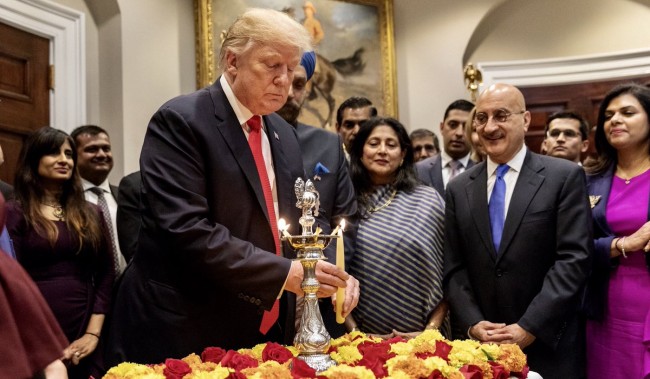NRI PULSE STAFF REPORT
Washington, D.C., October 21, 2025: U.S. President Donald Trump extended his greetings to millions of Americans celebrating Diwali on Monday, describing the festival as a powerful reminder of light’s victory over darkness and good’s triumph over evil.
In a message shared on X (formerly Twitter), Trump called the festival of lights “a time to come together with family and friends” and praised the spirit of hope and renewal it represents.
“Today, I send my best wishes to every American celebrating Diwali — the ‘Festival of Lights,’” he wrote. “For many Americans, Diwali is a timeless reminder of light’s victory over darkness. It is also a time to bring families and friends together to celebrate community, draw strength from hope, and embrace a lasting spirit of renewal. As millions of citizens light diyas and lanterns, we rejoice in the eternal truth that good will always triumph over evil.”
Diwali, one of the most significant festivals for Hindus, Jains, Sikhs, and some Buddhists, symbolizes the triumph of light over darkness, knowledge over ignorance, and good over evil. It is celebrated by millions across the United States, reflecting the growing cultural influence of Indian Americans and South Asian communities nationwide.
Trump’s Diwali message follows a long-standing tradition of U.S. presidents and political leaders acknowledging the festival as part of America’s multicultural fabric. Such gestures are often seen as a nod to the nation’s diverse immigrant communities and an acknowledgment of their contributions to American society.
This year’s Diwali greetings come amid heightened attention to U.S.–India relations and the political influence of the Indian American community, now one of the fastest-growing ethnic groups in the United States.
While Trump’s message was warmly received by many, some observers noted that, like several other political greetings this year, it did not explicitly mention the Hindu community by name — a point that has sparked debate about the importance of specific cultural recognition in public statements.
Cover photo from our archives.



